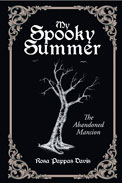
 |
Abandonment of a piece of property does not make it open to any curious gawker who wanders onto it on a whim. Fifteen-year-old Maury and her cousin, Lexie (of the same age), are old enough to know this but too young to care. After all, the forbidden is always intriguing. The old Harwell place belonged to a Texas oil baron and his family, although they moved out thirty years ago after the tycoon mysteriously disappeared during a trip to Africa. They left behind aging servants who gradually died and left the grand house to fall into disrepair. Sensitive, nostalgic Maury swears she sees ghostly lights glowing through otherwise empty windows. But she is too shy to explore the property alone. Cousin Lexie, inquisitive and dauntless, must help.
The girls' maternal grandmother, with whom they are spending part of their summer, has no objection to Maury's quest to read everything available about the old house. Trespassing on the disused property, though, is another matter. The Harwells were her dear friends and neighbors, and Mak, their reclusive elderly caretaker, still looks after the grounds. Gigi, the grandmother, respects his privacy even if the girls do not. But when the cousins' repeated ghostly encounters on or near the property continue to unsettle them, she sets out to investigate. Mak's childhood rescue from a life of drudgery in the diamond mines of Africa is as much a surprise to her as to the girls. Shocks only continue with what Gigi discovers once the girls return home.
With this novella, Davis enters the realm of young adult fiction for the first time. Her previous titles were written for children. Davis has worked extensively with children and youth. This experience is evident in her writing, as she imbues her two young protagonists with divergent personalities rather than portraying them both as jaded or obnoxious. The author thus avoids the creation of stereotypical teenagers.
Maury is unabashedly introverted and bookish. Though the more extroverted, Lexie is outgoing in the innocent way common in a decidedly younger child. Neither girl is romance-crazy. The absence of this trope from a narrative about adolescents is refreshing. The cousins joyfully spend time in the presence of significantly older people and are willing to learn from them. Lexie has fewer experiences than Maury with ghosts, but she readily perceives Maury's distress at such meetings and is not dismissive of her feelings. She also takes Maury's book research about the mansion seriously, though she does not share her keen interest in it. Gigi's eventual admission to a paranormal experience demonstrates her sensitivity to such things and her readiness to trust what her granddaughters tell her, even though it may seem fantastic.
Anyone drawn to Kate Morton's The Distant Hours will likely enjoy the fact that this book also has a plot centered on a rundown house with a troubled past. Like The Secret Garden, this book also features an old man anchored to a piece of property seemingly trapped in a bygone era. Readers concerned with the plight of children in Africa's mines may also wish to read it.